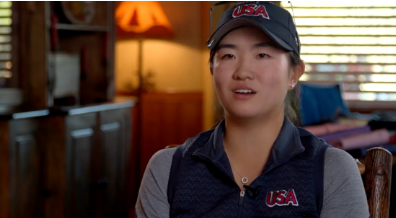She’s a golf prodigy and the world’s No. 1 amateur. Her season at Stanford could be historic
By: Ron Kroichick – The San Francisco Chronicle
 Stanford freshman Rose Zhang takes a practice swing at Siebel Varsity Golf Training Complex. Zhang is the No. 1-ranked women’s amateur in the world.
Stanford freshman Rose Zhang takes a practice swing at Siebel Varsity Golf Training Complex. Zhang is the No. 1-ranked women’s amateur in the world.
Rose Zhang struck an awkward balance, equal parts sheepish teenager and self-assured athlete.
She posed for photos at Stanford’s practice facility one day last week, with golf balls scattered around her. A player on the men’s team walked past on his way to the range. Zhang momentarily recoiled in embarrassment.
Shortly thereafter, upon learning of a Twitter account named “Rose Zhang Tracker” spreading the word about her feats on the course, she offered a bemused smile and said, “Oh, my gosh, that’s so weird.”
Even so, Zhang acknowledged she’s cool with the rising attention. It’s a natural byproduct of becoming entrenched as the world’s No. 1-ranked women’s amateur golfer — while acclimating to dormitory life as an 18-year-old college freshman.
Zhang has spent the past 104 weeks, or two full years, atop the world ranking. She won the U.S. Women’s Amateur last year and the U.S. Girls Junior this past summer. Then, in less than a month at Stanford, she won her first three college tournaments.
No previous Cardinal player launched his or her career with three consecutive victories. Not Tom Watson. Not Patrick Rodgers or Maverick McNealy. Not Andrea Lee or Mariah Stackhouse.
And, no, not even Tiger Woods.
“There’s not a lot left on Rose’s amateur resume that she hasn’t checked off, and that reminds us of the Big Cat,” Stanford coach Anne Walker said, referring to Woods (who, for the record, won two of his first three college starts).
Zhang, widely regarded as one of the best female amateurs ever, anchors a powerful Stanford team ranked No. 1 in the nation. The Cardinal also boast Rachel Heck, last season’s NCAA individual champion, senior Aline Krauter, junior Angelina Ye and freshman Caroline Sturdza.
But the equation begins with Zhang, a polite and unassuming prodigy from Irvine. She started playing golf at 9, routinely started winning tournaments at 13 and soon started to find herself engulfed in predictable scrutiny.
When will she turn pro? Why would she attend college? Doesn’t she realize there’s fame and fortune waiting in professional golf?
Those are inevitable questions for teenage phenoms, on the women’s side (Lydia Ko didn’t attend college) or the men’s (Jordan Spieth spent one year at Texas). There’s no clear formula, as Michelle Wie West illustrated by turning pro before her 16th birthday and still enrolling at Stanford. She didn’t play for the Cardinal, though she fulfilled a longtime dream by attending the school and earning her degree.
Zhang, similarly, stirred speculation about her plans as far back as her freshman year of high school. She remained undeterred.
Rose Zhang waits, but Stanford teammate Rachel Heck wades into wild world of NIL deals
“I just really want to experience college,” she said. “I think college is a very important step. It’s a great experience — you meet different people, understand how to live independently, make mistakes freely, just learn to adjust as a whole. …
“There are a million voices out there, but you can’t listen to them. You have to listen to yourself and the people around you.”
So, just like any other newcomer, Zhang plunges into campus life. She marveled at the diversity of students on her dorm floor: one who lives on a boat three months every year studying marine biology, another standout mathematician, countless computer science majors, a football player, track and field athlete and fencer.
Or, for a quick reminder that excelling on the golf course carries only so much cachet, Zhang considers her roommate, Safiyah Seck: She’s on a pre-med track.
The prospect of attending college once gave Zhang “jitters,” as she put it, but she’s quickly blended in with her new group of friends. They go out to dinner, take hikes and study together, giving Zhang a respite from her fast-track golf career.
“I was worried about how talented and smart the rest of the Stanford kids are, so I was wondering if I was going to be compatible,” she said. “It was a bit overwhelming. But once I came onto campus I was welcomed by my RAs in my dorm, and that helped put me at ease.”
Zhang picked up the game soon after her dad, Henry, did at the urging of a friend. She enjoyed tennis and swimming, but she didn’t like running and quickly realized she didn’t need to run to succeed in golf. And the feeling of making solid contact with the ball was exhilarating.
Still, after several top-10 finishes but no wins in American Junior Golf Association events at age 12, she called her childhood coach, George Pinnell, in frustration. She wanted to know when she was going to win a trophy. Pinnell laughed at the memory, given Zhang’s collection now.
Pinnell also recalled the way golf helped Zhang become more mature and self-confident. When she was younger, Pinnell helped smooth occasional tension between her and Henry, who was tough to please. At about age 15, Zhang began telling Pinnell she would talk to her dad.
Along the way, she became consumed by practice. She forces herself to make 100 consecutive 4-foot putts every day, and sometimes a smaller number of 6-footers and 9-footers. Zhang also jumps rope as part of her daily routine, a habit some junior players have emulated at Oak Creek Golf Club in Irvine, where she played growing up.
That provided a reminder of her impact as the world’s top amateur — as did the number of Asian American spectators who came out to watch her win last weekend’s Stanford Invitational.
“I feel like it’s a title that allows me to bring inspiration to other people,” Zhang said. “After I became No. 1, I definitely have more influence in terms of social media and kids around me.”
Or, as Pinnell said, “We never talk about the No. 1 ranking, but she knows it’s significant. She knows it will go away if she doesn’t take care of that little white ball.”
That’s not a problem so far. Zhang shot 1-over-par 73 in her inaugural round at Stanford, but she’s posted even-par or better in all eight rounds since then.
She blitzed the field last weekend, shooting 65-65-67 for a winning total of 16-under.
Zhang’s fast start has sparked chatter of a potentially historic season. Lorena Ochoa set the standard in 2001-02, her sophomore year at Arizona, when she won eight times and finished second in her other two starts. Then she turned pro and quickly became a dominant force on the LPGA Tour.
Twenty years later, Zhang seems more interested in bonding with her teammates. When she finished her first tournament Sept. 28 in Seaside (Monterey County), other Stanford players flooded onto the green for hugs. She obliviously asked if they won the team competition, not realizing that was the point of the celebration.
This week, Zhang posted a brief video to Instagram showing her goofing around with two teammates on the practice green. She clearly relishes the camaraderie of college golf, saying, “The team aspect is very appealing.”
Zhang leads the team with a graceful swing distinctive for its tempo, reminiscent of Ko or Rory McIlroy. Walker described the way Zhang is always in sync — hands with arms, arms with shoulders, shoulders with hips, hips with feet. The result is a rhythmic, reliable action.
But her success runs deeper, to the point Walker referred to her “golf genius.” Zhang once fixed her swing in 10 minutes on the range, for example, by mimicking it in slow motion without hitting a ball. Or consider the Curtis Cup in August, when she gave Heck a tip on why she wasn’t hitting wedge shots with her customary precision.
Last week, on the range, Walker noticed one Stanford men’s player approach Zhang and pepper her with questions. Walker saw that as a huge sign of respect, especially for an 18-year-old freshman.
“I’ve heard Tiger speak about the game a couple of times, and he just talks about it at a different level,” Walker said. “It’s like someone describing their masterpiece painting. The words are different, the passion is different — you can just see in their eyes they’re talking at a different level.
“It’s the same with Rose. She talks about her game and you can just see she understands it in a different way.”
She understands it enough to know wild amateur success does not automatically translate to wild professional success.
For all her skill and poise, Zhang shot 76-80 at the Olympic Club in June, to miss the cut by eight strokes in the U.S. Women’s Open. She stands No. 263 in the overall world ranking, including pros.
Pinnell, Zhang’s coach since she was 11, expects her to stay at Stanford “at least a couple of years.” It seems unlikely she will stay all four years, but she’s clearly in no rush to hit the road.
“Rose is smart enough and mature enough to know the tour is going to be there when she’s ready,” Heck said. “This is a once-in-a-lifetime opportunity to go to college and have that team aspect. Once you go out on tour, you’re pretty much on your own.”
Zhang emits an innocent teenage vibe, but she also shrewdly leaves the door open when the turn-pro question surfaces. She insisted she has “absolutely no clue” when she might leave school and instead focuses on “whatever I need to do at the moment.”
Then she paused, chuckled and added, “I’m definitely staying in college right now. I’m here.”
Ron Kroichick covers golf for The San Francisco Chronicle. Email: rkroichick@sfchronicle.com Twitter: @ronkroichick
Image: Brontë Wittpenn/The Chronicle
























